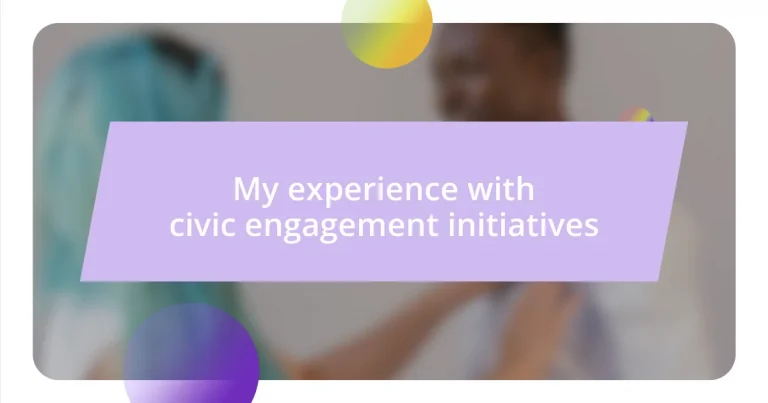Key takeaways:
- Civic engagement fosters community belonging and empowers individuals to influence positive change through initiatives like volunteering and grassroots advocacy.
- Participation in civic activities develops essential skills such as communication, leadership, and problem-solving, enriching both personal and professional growth.
- Challenges like mobilizing volunteers, navigating differing community opinions, and securing funding can be overcome by setting clear goals, building relationships, and embracing feedback.
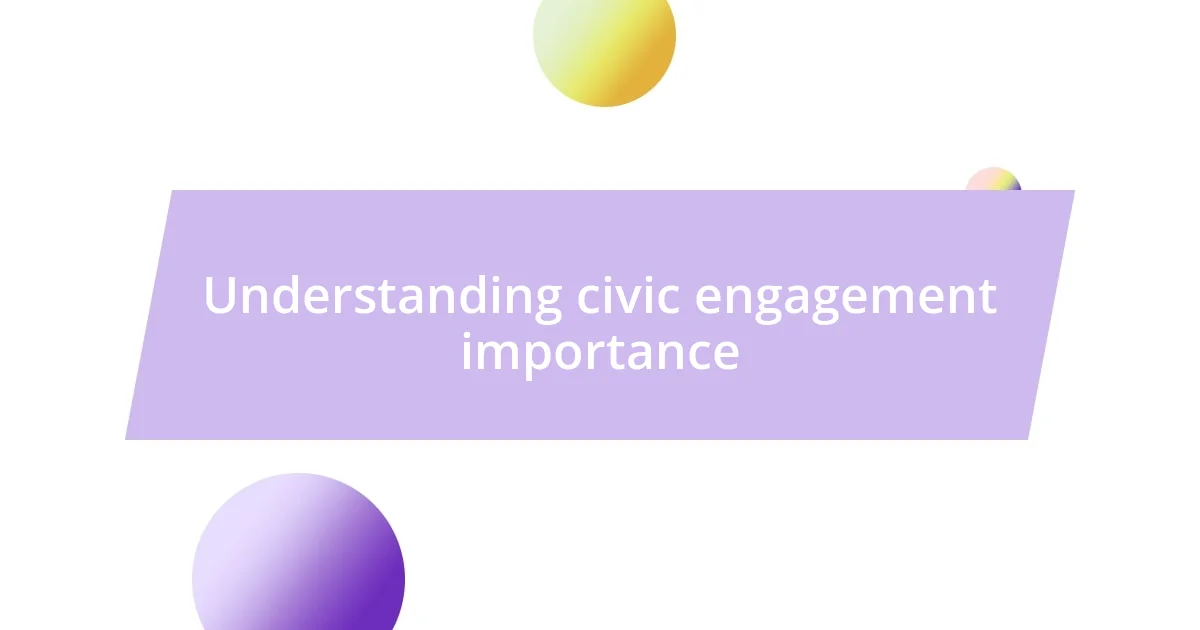
Understanding civic engagement importance
Civic engagement is essential because it fosters a sense of community and belonging. I remember attending a local town hall meeting, feeling the collective energy of people passionate about their neighborhood. It struck me then—how can positive change happen if we, as citizens, don’t take the initiative to voice our opinions and take part in our democracy?
When I participated in a community cleanup initiative, I felt an overwhelming sense of purpose. It wasn’t just about picking up trash; it was about restoring pride in our shared space and connecting with my neighbors. This experience highlighted a vital aspect of civic engagement: its ability to unite diverse individuals for a common goal. Can you recall a moment when you felt empowered to make a difference in your community?
Furthermore, engaging in civic activities nurtures critical thinking and encourages informed decision-making. I often find myself reflecting on how discussions with others during volunteer events opened my eyes to perspectives I hadn’t considered. Isn’t it fascinating how a simple conversation can shape our understanding and inspire action? By participating in civic engagement, we not only contribute to our community but also grow as individuals in the process.
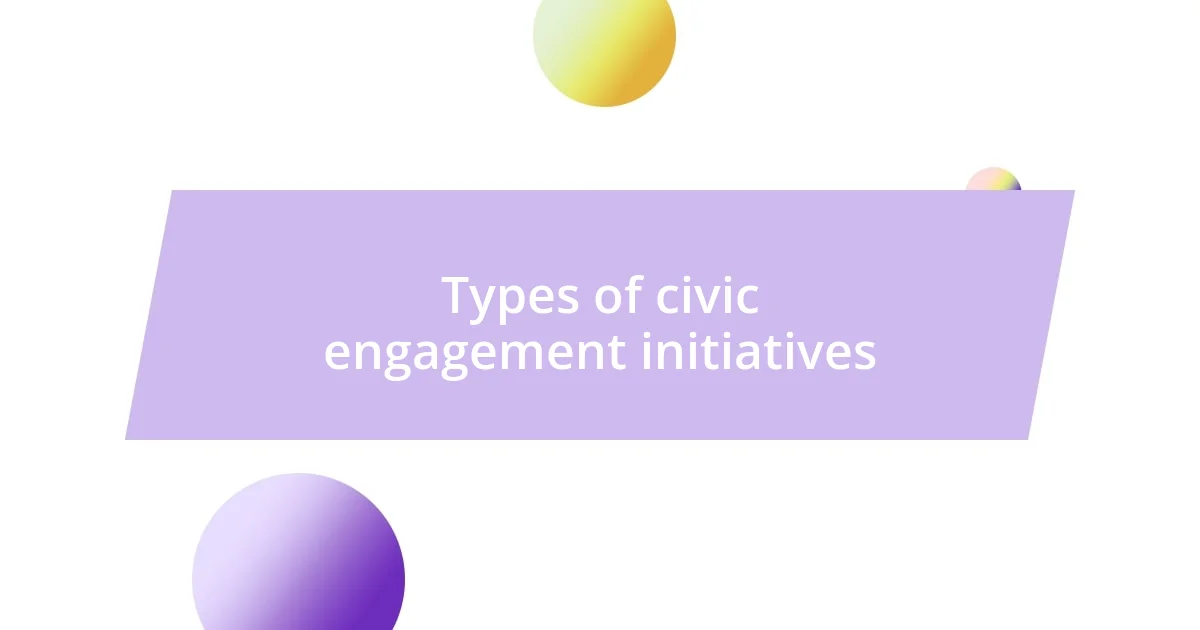
Types of civic engagement initiatives
Civic engagement initiatives come in various forms, each offering unique opportunities for individuals to connect with their communities. Volunteering for local charities stands out to me; it not only offers support to those in need but also strengthens the bonds among community members. I vividly recall when I worked with a food bank, feeling the warmth of gratitude from those we served. It was a beautiful reminder of how collective efforts can alleviate challenges while building lasting relationships.
Another type that intrigues me is grassroots advocacy. This often involves mobilizing community members to rally around specific issues, whether it’s environmental causes or social justice. I remember participating in a march advocating for greener policies in our city. The palpable energy and determination among individuals from all walks of life were inspiring. It demonstrated how grassroots movements can genuinely impact local legislation and inspire broader change.
Finally, there’s community organizing, which focuses on bringing people together to identify and solve local issues. I had an eye-opening experience when I joined a group aimed at improving our neighborhood’s public transportation options. Through dialogues and strategizing sessions, we were able to voice our concerns effectively to local authorities. This hands-on experience highlighted the importance of structured initiatives in amplifying community voices for tangible change.
| Type of Initiative | Description |
|---|---|
| Volunteering | Hands-on support for local charities |
| Grassroots Advocacy | Mobilizing communities around specific issues |
| Community Organizing | Identifying and solving local problems collectively |
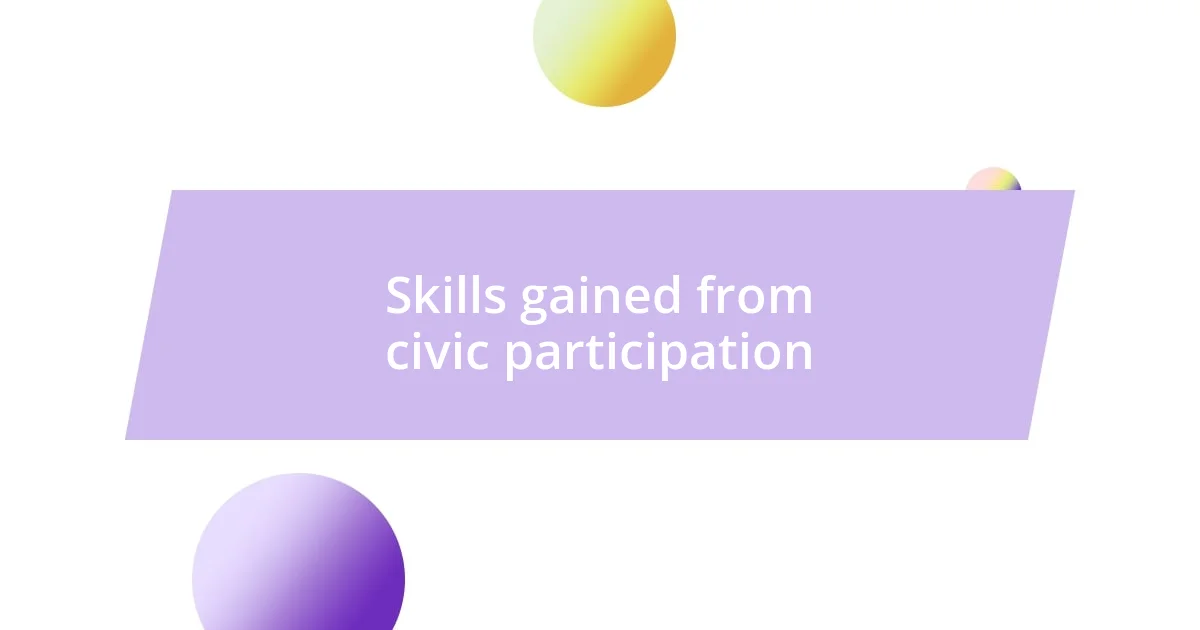
Skills gained from civic participation
Engaging in civic participation has taught me an array of valuable skills that extend far beyond the initiatives themselves. For instance, I gained substantial communication skills through conversations with diverse individuals during various projects. A memorable moment was during a community forum where, feeling nervous at first, I stepped up to share my thoughts. That experience not only improved my public speaking but also affirmed the significance of using my voice to influence change.
Here are some key skills I’ve developed from civic participation:
- Leadership: Taking charge of community-driven projects pushed me to organize and motivate others.
- Teamwork: Collaborating with a group on a shared goal highlighted the power of collective effort.
- Problem-solving: Facing challenges in initiatives required me to think critically and propose practical solutions.
- Empathy: Working with those from different backgrounds deepened my understanding of their struggles and perspectives.
- Civic literacy: Participating in discussions around local issues sharpened my awareness of civic processes and responsibilities.
Each of these skills feels like an invaluable asset that enriches both my personal and professional life. I still remember the warmth of laughter and connection during our neighborhood potlucks, where every interaction helped me refine my interpersonal skills while reinforcing the idea that every contribution counts.
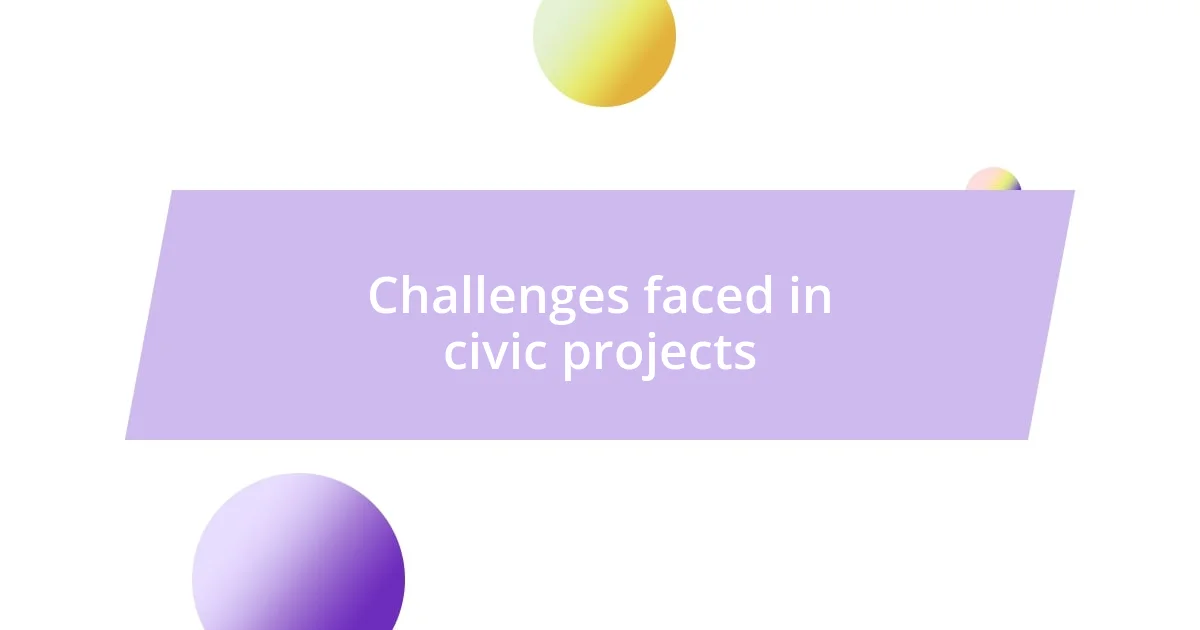
Challenges faced in civic projects
One significant challenge I encountered in civic projects was the difficulty of mobilizing volunteers. I remember organizing a cleanup day in our local park, only to be met with low turnout despite our enthusiastic planning. It made me wonder, what prevents people from participating? In my experience, busy schedules and lack of awareness about events can often keep community members from engaging.
Another hurdle I’ve faced is the divergence of opinions within a community. During a discussion about a proposed community garden, tensions arose between those who supported it and those concerned about potential land use impacts. It was eye-opening to see how personal stakes can complicate collaboration. I learned that facilitating dialogue and finding common ground is crucial, even if it feels like a slow process at times.
Lastly, securing funding and resources for initiatives can be daunting. When I was part of a campaign to secure funds for local youth programs, I was surprised by the bureaucratic challenges and the uphill battle to find grants. It raises a question many of us ponder: How can we best support grassroots initiatives despite financial hurdles? Drawing upon connections in the community proved invaluable. I realized that resourcefulness is key, and sometimes, asking for help can yield unexpected solutions.
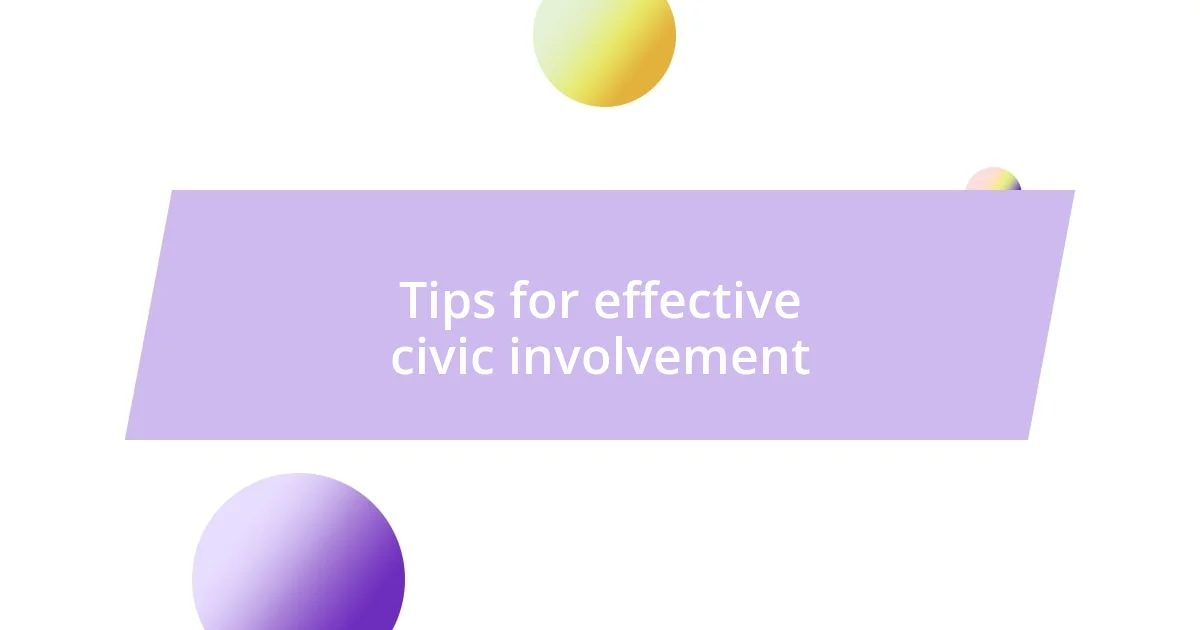
Tips for effective civic involvement
Engaging effectively in civic activities often starts with setting clear goals. I remember when I joined a neighborhood watch program; we wanted to enhance community safety. By identifying specific safety issues that concerned residents, we focused our efforts on what mattered most. It made me realize how critical it is to communicate clear objectives, as this not only motivates participants but also aligns everyone’s energy toward a common purpose.
Another essential tip is to cherish the relationships built along the way. I vividly recall a time when I partnered with a local school to organize a reading program. It was a small initiative, but the bonds I formed with students and parents were transformative. Each interaction became a stepping stone, turning acquaintances into friends. These connections foster a sense of belonging that energizes future projects, reminding us that civic engagement is as much about community building as it is about action.
Lastly, don’t shy away from embracing challenges and seeking feedback. I once took the lead on a recycling campaign that faced its share of obstacles. A few months in, we realized the community wasn’t as engaged as we had hoped. Rather than feeling discouraged, I sought feedback through surveys and open forums to understand their thoughts. This approach not only helped me refine our strategies but also demonstrated to the community that their voices truly matter. How can we improve if we don’t first listen? It’s a powerful reminder that civic engagement is a two-way street, and being open to constructive criticism can pave the way for more impactful initiatives.












